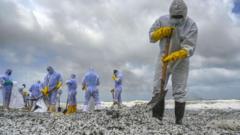---
Nearly 50 years after the Vietnam War came to a close, the legacy of Agent Orange continues to haunt many Vietnamese, including individuals like Nguyen Thi Ngoc Diem. Born with a malformation likely linked to her father’s exposure to the herbicide, Ms. Diem recently received some assistance through a U.S.A.I.D.-funded program that provided graphic design training and employment opportunities. However, as the Trump administration moves to freeze essential foreign aid, many fear this support may soon cease.
"Everything seems uncertain now," expressed Ms. Diem from her wheelchair, surrounded by reminders of her struggle. The training that initially provided her with hope also recently led to the closing of her workplace. With the looming end of U.S. support, she anticipated receiving a computer to enhance her work, or at least a small loan to help procure one, yet both remained in jeopardy.
Her situation symbolizes the broader issue faced by Agent Orange victims, to whom the U.S. historically promised assistance. Despite their significant suffering due to chemicals used during the war, political shifts have brought about a stark reduction in available aid for recovery.
“Why should we be left behind?” Ms. Diem questioned. “This is part of America’s history, and addressing it should be part of their responsibility.” The stalls in aid not only stagnate individual recovery efforts but also halt the potential for rebuilding relationships between Vietnam and the United States.
As the situation unfolds, those affected continue to express their hope, but the uncertainty casts a shadow over the future of support meant for healing and progress.
Nearly 50 years after the Vietnam War came to a close, the legacy of Agent Orange continues to haunt many Vietnamese, including individuals like Nguyen Thi Ngoc Diem. Born with a malformation likely linked to her father’s exposure to the herbicide, Ms. Diem recently received some assistance through a U.S.A.I.D.-funded program that provided graphic design training and employment opportunities. However, as the Trump administration moves to freeze essential foreign aid, many fear this support may soon cease.
"Everything seems uncertain now," expressed Ms. Diem from her wheelchair, surrounded by reminders of her struggle. The training that initially provided her with hope also recently led to the closing of her workplace. With the looming end of U.S. support, she anticipated receiving a computer to enhance her work, or at least a small loan to help procure one, yet both remained in jeopardy.
Her situation symbolizes the broader issue faced by Agent Orange victims, to whom the U.S. historically promised assistance. Despite their significant suffering due to chemicals used during the war, political shifts have brought about a stark reduction in available aid for recovery.
“Why should we be left behind?” Ms. Diem questioned. “This is part of America’s history, and addressing it should be part of their responsibility.” The stalls in aid not only stagnate individual recovery efforts but also halt the potential for rebuilding relationships between Vietnam and the United States.
As the situation unfolds, those affected continue to express their hope, but the uncertainty casts a shadow over the future of support meant for healing and progress.























